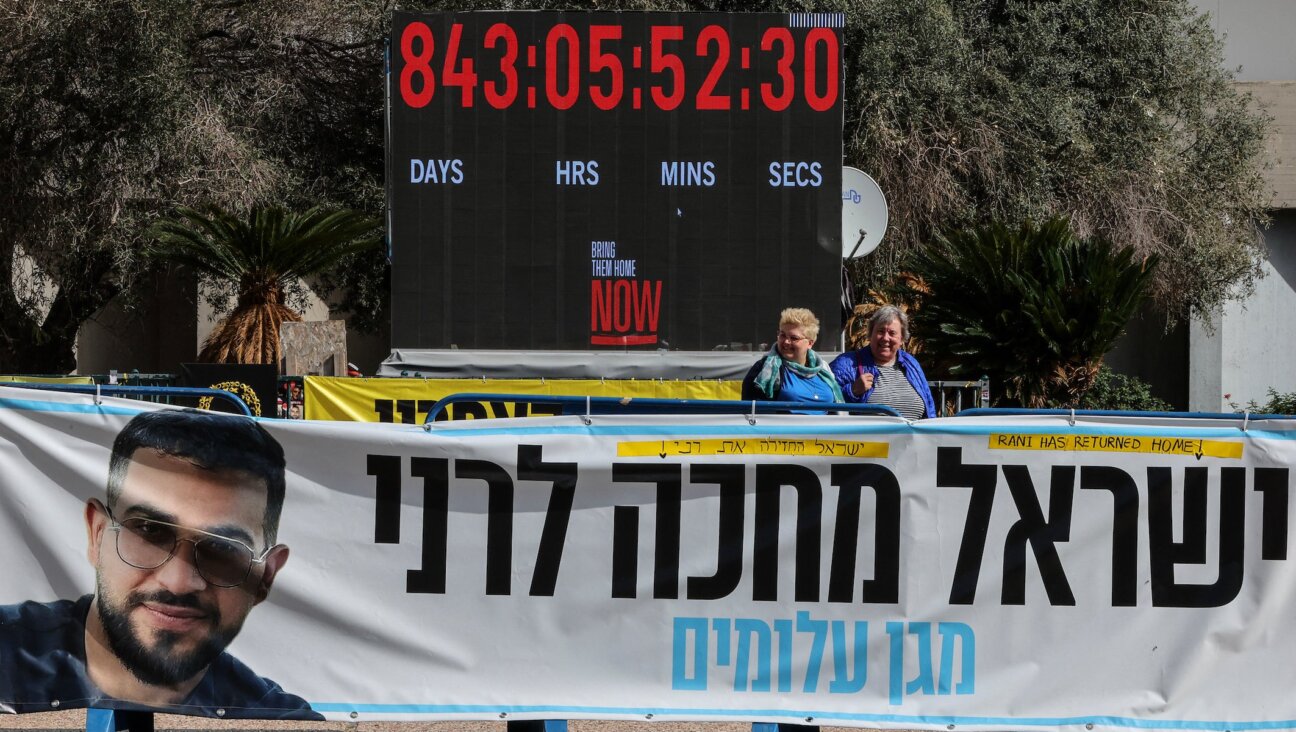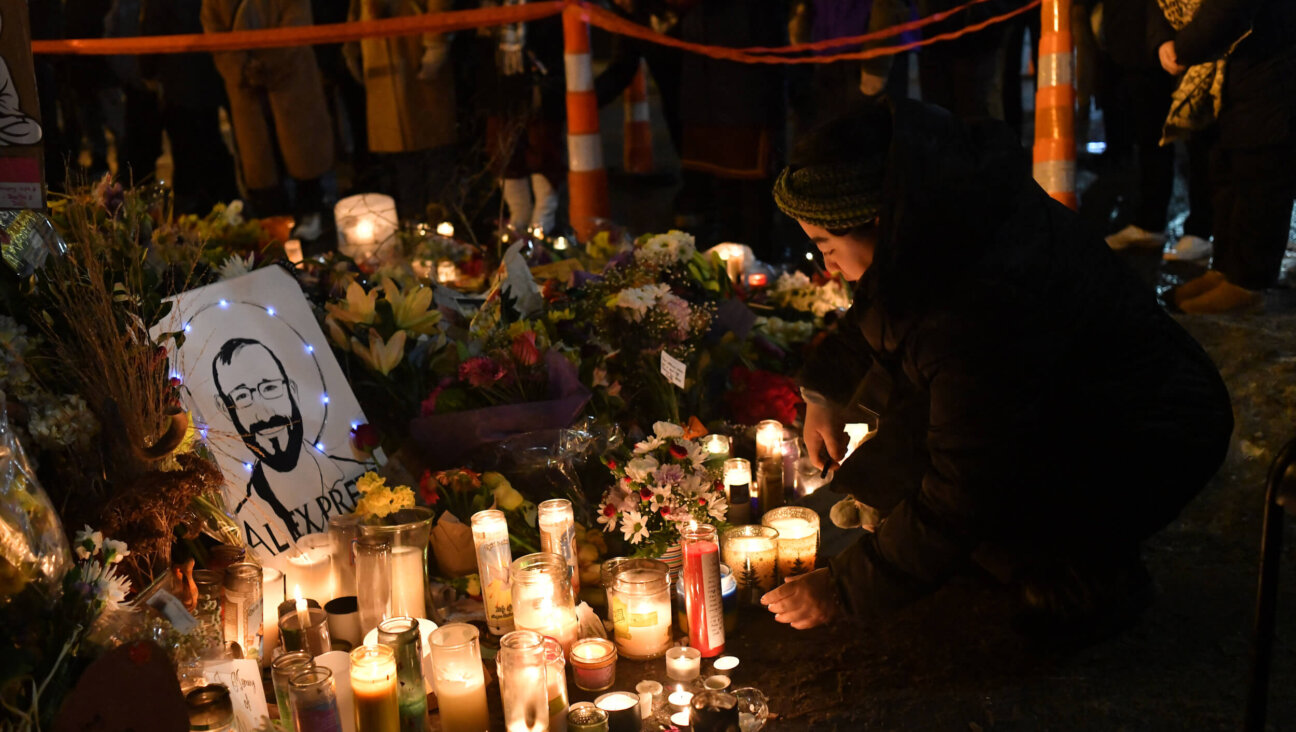Gorka’s Ouster Caps Defeat Of Nationalists In Fight For Trump’s White House

Image by Getty Images
The departure of presidential aide Sebastian Gorka from the White House Friday, just one week after that of his mentor, Stephen Bannon, capped a crucial victory for military generals in the Trump administration.
As Gorka himself put it in his August 25 letter to President Trump, “[G]iven recent events, it is clear to me that forces that do not support the MAGA [Make America Great Again] promise are — for now — ascendant within the White House.”
To a large extent those to whom Gorka’s side has bowed consist, ironically, of “alpha males” — a favorite Gorka term—from the country’s military establishment, with the battle reaching its peak and its resolution as key decisions were at stake in Afghanistan.
Whatever the dangers or merits of having military generals as key power players in Trump’s White House, it’s clear that they were able to do what a series of exclusives by the Forward on Gorka’s ties to right-wing extremists could not. Picked up widely and confirmed by other news outlets, these stories documented Gorka’s strong ties to far-right anti-Semitic and racist forces in Hungary before he immigrated to America in 2008 and became a citizen in 2012.
This included his support for the formation of a non-governmental paramilitary group led by known anti-Semites and his membership in the modern day incarnation of the Vitézi Rend, a group listed by the U.S. State Department as having been “under the direction of the Nazi Government of Germany” during World War II. (Gorka denied that he ever “swore allegiance formally.”)
Three senators called on the administration to investigate whether Gorka answered questions fully and truthfully about his affiliations when he applied for his visa and his citizenship. Fifty-five Democratic House members called on Trump to fire him. But all this only seemed to solidify his standing with Trump’s base — and with Trump himself — until the generals came.
It was the arrival of John Kelly, a retired Marine Corps general, as Trump’s chief of staff at the end of July that marked a turning point in the internal White House wars over the administration’s priorities. Soon after he assumed his post, Kelly delivered his first big staff news to Bannon, Trump’s chief strategist: He, Bannon, would be going shortly in a carefully choreographed amicable departure. But Bannon’s full-throated support for Trump’s comments defending some of the white nationalists in Charlottesville, Virginia as “very fine people” — and his calls for more of the same from Trump — accelerated his departure date.
Bannon was Gorka’s key protector, and the official who brought him into the White House from the hard-right news site Breitbart News. There, he had worked as national security editor under Bannon, who ran the enterprise. Bannon was also the man seen as central to Trump’s strategic branding as savior for legions of white Americans bearing grievances about their sense of lost status. Gorka, in turn, was the administration’s designated public pugilist on cable news for the ongoing campaign to stoke and prioritize the resentments of this Trump base against Muslims, Mexicans, Chinese and other “others,” putting it above all other competing interests.
Though hired ostensibly to be Trump’s chief consultant on counter-terrorism, Gorka’s expertise in this field was dismissed by an array of recognized authorities, including his own thesis advisor. Persistent reports asserted that Gorka had been unable to obtain the top secret security clearances necessary for him to sit in on crucial meetings, rendering minimal his ability to influence policy or, in fact, to do his ostensible job. Repeated attempts by the Forward to confirm his clearance status were refused by the White House. Some lawmakers suggested that his ties to extremists in Hungary might be part of the problem.
But Gorka’s willingness to take on the role of strident public defender of Trump’s policies, actions and statements as a ubiquitous presence on cable TV news channels won him the support of Trump, an avid cable news consumer. The president was said to love Gorka’s aggressive presentations, which often involved attacking the professionalism of critical interviewers.
Still, it may have been that very on-camera stance that eroded Gorka’s credibility beyond redemption following the violence during white nationalist protests in Charlottesville on August 11 and August 12 — especially after the killing of a counter-protester by an alleged fascist sympathizer who now stands charged with her murder.
On August 9, just two days before that fatal weekend, Gorka condemned those who played up the significance of violence by extreme right-wing domestic groups in America, insisting that jihadist terrorism from radical Muslim groups posed America’s only real security threat. “It’s this constant, ‘Oh, it’s the white man. It’s the white supremacists. That’s the problem,’” he told Breitbart News sarcastically. “No, it isn’t.”
One day earlier, Gorka stated on MSNBC, “There has never been — never been — a serious attack … or a serious plot that was unconnected from ISIS or Al Qaeda, at least through the ideology and…the tactics, the training, the techniques, and the procedures — that they supply through the internet. Never happened. It’s bogus.”
Several analyses have found that since the jihadist attacks on the World Trade Center and the Pentagon on September 11, 2001 that killed 3,000 people, domestic right-wing terrorism has been far more common — and killed more people — than acts of Islamist terrorism.
Even before Kelly’s arrival at the end of July, a quiet war over mid-level personnel in the national security apparatus had left Bannon and Gorka increasingly without troops there. Lieutenant General H.R. McMaster, the head of the National Security Council, pressed a purge of those who, like Bannon and Gorka, painted Muslims or Islam itself as the problem with a broad brush, as part of a clash of civilizations.
On July 6, McMaster won the reassignment of Tera Dahl, the NSC’s deputy chief of staff to a job outside the White House. Dahl, a former Breitbart columnist, co-founded a think tank with Gorka’s spouse, Katharine Gorka, that derided the use of image-conscious terms when describing jihadist terrorism. The United States “must stop the misguided narrative that terrorism and extremism have nothing to do with Islam,” declared a white paper published by the group in 2014.
By contrast, McMaster, who has been responsible for developing strategies in Afghanistan and Iraq that involve partnering with conservative Muslim factions to fight ISIS and Al Qaeda, issued a warning to NSC staff that using the term “radical Islamic terrorism” was counterproductive to messaging efforts in the broader fight against terrorism.
On July 21, McMaster dismissed Rich Higgins, the NSC’s director of strategic planning. Higgins had argued in a memo that Trump’s presidency was under unprecedented attack by an alliance of globalists, the “deep state,” and Islamists seeking to destroy America. The memo argued that this problem constituted a national-security priority and offered recommendations to combat it.
Days later, McMaster fired Derek Harvey, the NSC’s senior director for the Middle East, whose ultra-hawkish views on Iran were in accord with Trump’s own. Like Higgins, Harvey was a Bannon ally.
Then, on August 2, just days after Kelly’s arrival, McMaster fired Ezra Cohen-Watnick, the NSC’s senior director for intelligence programs. Cohen-Watnick, a 31-year-old former Pentagon official, had been hired by former National-Security Adviser Michael Flynn. McMaster had sought earlier to dismiss Cohen-Watnick, soon after he stepped in to head the NSC following Flynn’s departure under a cloud of scandal related to his undisclosed meetings with Russian officials. But Bannon and the president’s son-in-law, Jared Kushner, convinced Trump to protect him. With Kelly now in place as chief of staff, McMaster got his way.
“Regrettably,” wrote Gorka in his departing letter to Trump, “outside of yourself, the individuals who most embodied and represented the policies that will ‘Make America Great Again,’ have been internally countered, systematically removed, or undermined in recent months.“
Citing Trump’s August 21 speech in which he reluctantly authorized more U.S. troops for Afghanistan to stem a surge by the Taliban, Gorka wrote, “The fact that those who drafted and approved the speech removed any mention of Radical Islam or radical Islamic terrorism proves that a crucial element of your presidential campaign has been lost.”
McMaster and Secretary of Defense Jim Mattis, another retired Marine Corps general, were the key architects of this plan. With many of Trump’s nationalist supporters now gone, they are seemingly in control of the Trump White House.
But even now, it’s far from clear they are in control of Trump.
Contact Larry Cohler-Esses at [email protected]















